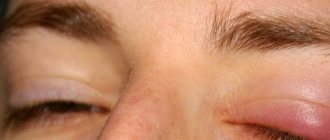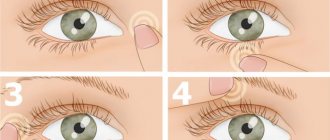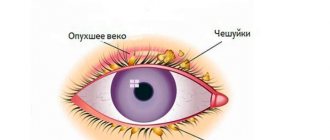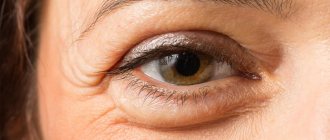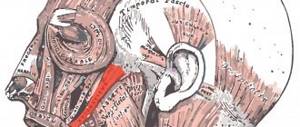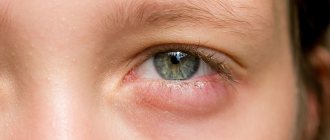It is known that the human body is a delicate instrument; various problems in it can manifest themselves in completely unexpected ways. Many of us at least once in our lives have encountered such a phenomenon when the upper eyelid twitches.
If this happened only once, we are unlikely to think about the reasons for the appearance of hyperkinesis (the medical name for the phenomenon). If this happens quite often, you will find this article interesting and useful. Why does the upper eyelid twitch? What is the human body trying to say by giving such signs? What to do.
Upper eyelid twitches: features
The answer to the question why the eyelid twitches is the overwork of the body of a person who had a busy, stressful day, he was very nervous, and as a result, such psychological stress led to the appearance of an eye tic.
If this happens for only a few minutes, then it is important to simply devote more time to rest, after which such unpleasant sensations will go away on their own. However, what should you do in a situation where the tic continues for a long time, for example, a week or more. Perhaps there are other reasons for this phenomenon, called hyperkinesis in medicine.
A malfunction occurs in the brain centers responsible for the functioning of the muscular system of the eyelids. The fibers begin to actively contract, and the well-known twitching occurs. The upper eyelid or muscle fibers of the eyelids are a fairly common location for tic manifestations, as they have many nerve endings.
In neurology, a distinction is made between primary and secondary hyperkinesis. So, with primary symptoms, tics appear rarely, disappear on their own and quickly, and do not pose a threat to health. Secondary tics are spontaneous contractions that do not stop for a long time, leading to serious disturbances in the structure of the brain, damage to nerve fibers, and muscles of the eyelid.
A twitching eyelid of one or both eyes makes it difficult to concentrate, increases fatigue, and irritates a person, since it is not possible to control such a symptom. The eyelid may twitch for several seconds, minutes, and sometimes for several hours or days. In this case, medical attention is required.
What are the causes of the disease
There are many factors that provoke the occurrence of tics, the main one being nervous and emotional exhaustion of the body. It can occur from constant intense mental activity, frequent lack of sleep, moving, flying, lack of rest, regular stressful situations that arise at work or in the family.
The reasons may be the following:
- Eye fatigue.
- Eye diseases that require you to blink a lot: conjunctivitis, blepharitis, chalazion.
- Dry eyes occur from sitting at a computer around the clock, in older people, from reading, if there is insufficient lighting.
- Twitching of the upper eyelid causes observation of rapidly moving objects.
- Smoking, drinking alcohol, coffee and strong tea excite the nervous system, tire and exhaust the body, and then the upper eyelid begins to twitch.
- Vitamin deficiencies, in particular lack of magnesium, potassium, loss of vitamin B.
- Past infectious diseases, acute respiratory infections and acute respiratory viral infections, operations.
- Weakening of the immune system, caused by many factors, also contributes to tics.
- Allergies to pollen, fluff, pet hair, dust, medications.
- Incorrectly selected or poor-quality lenses, continuous wearing of glasses.
The above reasons are usually provoked by the person himself, causing twitching eyelid syndrome.
By eliminating the cause, you can get rid of the constant twitching. Therefore, a person suffering from hyperkinesis just needs to change their lifestyle and be more attentive to their health. The attending physician may recommend taking soothing decoctions and extracts, and reducing the consumption of strong tea and coffee.
Common Causes of Myokymia
If a nervous tic of the eye is of a short-term, isolated nature, then the probable causes of its occurrence will include:
- severe stress: the body reacts by twitching the eyelid to mental stress, negative emotions and other factors that cause a stressful state;
- overwork: lack of sleep or poor quality of sleep leads to the fact that the muscles around the eyes do not receive proper relaxation and are in an overstrained state even at night;
- increased strain on the eyes (long hours of work at the computer, incorrectly selected vision correction products);
- dryness of the organs of vision: dry eye syndrome and, as a result, twitching of the eyelid can be caused by improper wearing of contact lenses, abuse of caffeine and alcohol, prolonged work at the computer, taking antidepressants and a number of antihistamines;
- unhealthy diet: often muscle cramps are caused by a lack of magnesium and B vitamins in food.
When the cause of twitching lies in stress, visual strain or fatigue, then, as a rule, to treat myokymia it is enough to remove the provoking factor, and the muscle spasms will stop. Preventive measures give good results:
- healthy, long sleep;
- taking sedatives as prescribed by a doctor;
- minimizing caffeine and alcohol in your diet;
- a complete healthy diet rich in vitamins and microelements;
- correct selection of vision correction, protection and moisturizing of the eyes with the help of an ophthalmologist.
Why can the eyelid twitch and what diseases can cause it?
Twitching of the eyelid occurs as a consequence of previous diseases or is a symptom of an incipient disease. Too frequent twitching may indicate increased intracranial pressure or the onset of an inflammatory process in the tissues of the eye.
In any case, when hyperkinesis occurs, it is important to find out why this is happening. Basically, such diseases are associated with neurological disorders affecting blood vessels or brain structures:
- Parkinson's disease;
- pathologies of cerebral vessels;
- meningitis;
- cervical osteochondrosis;
- damage to the facial nerve;
- brain tumors;
- birth injuries;
- neuroses, epilepsy;
- mental illness;
- diseases of internal organs, gastrointestinal tract, central nervous system.
Many diseases are accompanied by multiple tics, not limited to the eyelids and even the face. To identify the causes, consultation with an endocrinologist, nephrologist, gastroenterologist, or neurologist is necessary. Any of these diseases is quite complex, has serious consequences, and requires long-term treatment.
You can ignore the twitching eye if it is a short-term phenomenon and does not recur the next day. In the case when a nervous tic is observed day after day, it is better not to delay going to the clinic, since you may miss precious time for the treatment of a particular disease, which as a result can lead to its chronic form.
Why does the eyelid twitch or tremble?
The causes of a twitching eyelid are different:
- Overload of the eye muscles during prolonged viewing of TV or reading, as well as prolonged work at the computer.
- Failure in psycho-emotional state.
- Lack of important microelements in the body.
- Therapy with certain drugs.
- Nervous system dysfunctions.
- Drinking excess caffeine.
- Lack of sleep, drinking alcohol and smoking.
- Sometimes eyelid twitching can occur due to diseases such as conjunctivitis, blepharitis, dystonia, Parkinson's disease and Bell's palsy.
- Taking certain medications for epilepsy.
- Rarely, the symptom of a twitching eyelid is hereditary.
- Liver dysfunction.
- Infectious diseases suffered in the postoperative period.
- Allergies accompanied by dry or red eyes.
- Incorrect selection of lenses.
- Parasitic infection of the body can indirectly affect the innervation of the eyelids.
The eyelids have thin, poorly controlled muscles designed for exactly one brief function - blinking. Thus, it is quite difficult to control the circular muscle. Simply relaxing your face will not stop the tic.
Important! Short-term nervous tics are often found in children, since their psyche is less resistant to stress.
What can a doctor do?
One cannot ignore frequent twitching of the upper eyelid, since it is better to prevent any disease in a timely manner than to treat it. Hyperkinesis is one of the signs of a nervous system disorder and can be eliminated only by undergoing a course of special treatment.
An initial appointment with a doctor consists of collecting an anamnesis, studying the patient’s medical history, examination, and ordering laboratory and instrumental studies. The results of the examination will allow the doctor to draw up a complete picture of the disease, identify the cause, and prescribe the necessary treatment. Therapeutic therapy will be aimed at eliminating and treating the underlying cause of the disease. When the etiological factor is resolved, then its symptoms will disappear.
In any case, the choice of therapeutic therapy, as well as the course of treatment, should be prescribed individually for each patient, in accordance with the diagnosis and characteristics of the body. The most important thing in this case is not to let anything take its course, otherwise the person may face very disastrous consequences.
If it's stress
A nervous tic can be the body’s reaction to a variety of life situations. One such situation may be stress, to which each person reacts differently. The reaction to stress can be screaming, tears, rage, breaking dishes, torn paper into shreds...
But, if you try to cope with stress alone, while remaining outwardly completely calm, the consequences of a stressful situation can manifest themselves in the form of a nervous tic.
What to do if your eyelid twitches. If stress is not chronic, then when its cause disappears, the unpleasant symptom will go away on its own.
You shouldn’t go through all the troubles on your own; in such cases, the participation and friendly support of loved ones is very important. When you don’t want to strain your family with your problems, you should seek professional help from a psychotherapist who will help you find a way out of any insoluble situation.
Eye relaxation exercises
If you notice that your eyelid has begun to move, we recommend a number of simple but quite effective eye exercises for all forms of nervous fatigue (not acute neurosis). Perform them daily in the morning after waking up, and also repeat them at any convenient time when you want to distract yourself and relax.
- Stand as straight as possible, close your eyes as hard as you can, close your eyelids as tightly as possible. Inhale deeply, exhale slowly, slowly passing air through your lungs. Open eyes. Repeat five to six times.
- Blink quickly for fifteen seconds. By performing this exercise, you can reduce tension, completely relax the eye muscles, and cope with trembling of the upper eyelid.
- Warm your palms by rubbing against each other, fold one palm over the other, and place it over your eyes. Keep your palms in this position for several minutes. Darkness and warmth are great for calming and relaxing the eyes.
- Draw a variety of shapes with your gaze while keeping your head still. Circle, star, zigzag, spiral... Achieve continuous, smooth movements in a single rhythm. Finish the exercise as soon as you feel tired of the eye muscles.
- Another exercise from yoga practice is purifying vision by contemplating a flame. Light a candle and blink frequently at the flame. Do it for no more than 10 minutes.
Exercises will help get rid of nervous tension and improve blood circulation. This is almost the only way to deceive our consciousness, fixated on problems, to force it to focus on real bodily sensations.
Calming the nervous system
If you are concerned about such a problem, treat it as a signal from your body about incorrect behavior under stress. We often tell ourselves: I’ll rest when I’m done, I’ll sleep on vacation, I’ll start taking vitamins in the spring... The body cannot be fooled by such excuses. If your eyelid twitches, you cannot put off anti-stress measures.
Multivitamin preparations have a good effect on the functioning of the body as a whole and strengthen the immune system. You can specifically feed the nervous system using the following means:
- shock doses of magnesium and calcium strengthen nervous tissue;
- Taking vitamin C daily for a week will increase hemoglobin, which means that the tissues will be well supplied with oxygen, which has a positive effect on the nervous system;
- If your doctor allows it, take the recommended herbal nootropic drug for a month; this will help relieve mental fatigue, strengthen memory, increase reaction speed, and you will be less nervous;
- drink a mild sleeping pill at night; if there are no problems falling asleep, then a mild sedative for better rest during sleep;
- nicotinic acid (injections) will put you back on your feet after any stress in 10 days, strengthen capillaries, and normalize blood circulation; this drug also requires your doctor's approval.
Causes of eyelid twitching
— Chronic fatigue, lack of proper rest, constant lack of sleep. — A severe stressful situation and, as a result, a depleted nervous system. - Eye strain. Working at a computer 24/7 can lead to dry eyes. — Magnesium and calcium deficiency can cause involuntary twitching of the eyelid. - Excessive consumption of alcohol and coffee. - Recent illnesses. — Heredity.
Knowing all the reasons, you can easily eliminate this unpleasant condition. In most cases, it is enough to rest well and adjust your diet. Add foods rich in magnesium and calcium (spinach, asparagus, rye bread, nuts, beans, bananas). Limit the consumption of drinks that stimulate the nervous system. In some cases, it will be useful to take a course of sedatives. Of course, only after consulting a doctor.
You may be interested in Preventing vision impairment
How to strengthen your nerves with herbs
A nervous tic is an external manifestation of stress or overstrain of the nervous system. To smooth out the negative effects of stress, there are very good folk remedies.
The herb maral root (Leuzea root) will help strengthen your nerves. The herb should be brewed and drunk as tea or added to other teas.
- A decoction of sea buckthorn, hawthorn, and rose hips helps to cope with the problem perfectly. Boil the mixture of herbs for 10 minutes, add 1 tsp of motherwort herb. Pour everything into a thermos, after 5 hours the healing drink is ready. Instead of motherwort, you can add St. John's wort, thyme, fireweed, strawberry leaves, and blueberries.
- Nervous tics are treated with compresses made from plantain leaves. The leaves are crushed and poured with boiling water. The steamed warm mass is spread on a cloth and applied to the eyes for 20 minutes.
- Figs help to cope with nervous tics, since the reason may be a lack of vitamin B6, which is necessary to strengthen the nervous system.
Gymnastics and relaxation
If the upper eyelid twitches, then in the case of a neuropathic etiology of the tic, exercises, massage and relaxation are very effective in stopping the symptoms.
As soon as twitching appears in the eyelid, eyelid massage helps very well to relax the muscles. You just need to apply a little cream or oil to your eyelids and rub them with light movements with your fingertips.
Aromatherapy has long been known and has been successfully used in various fields: inhaling oils of orange, lavender, geranium, mint, and fragrant cinnamon are perfect for relaxation procedures and mental rest.
It’s comfortable to lie down or sit down, close your eyes, relax, imagine that a nice warm rain is falling, washing away the accumulated fatigue, tension, and negativity. Just 5 minutes - and renewal and ease for the body are guaranteed.
It has been proven that most ailments occur due to overstrain of the nervous system. Therefore, it is impossible to let things take their course, to ignore the small calls of the body, otherwise more complex difficulties will appear on the way, which will be much more difficult to get rid of.
Causes of myokymia
Why does the lower eyelid of the right eye twitch? The reasons are unclear. Most often, twitching occurs due to stress and fatigue, both mental and physical. Tired eyes due to sitting at the computer, TV for too long, or general eye strain are also possible causes. Excessive consumption of alcohol or caffeine can also cause this condition.
In rare cases, a lack of magnesium in the body can cause eyelid trembling. You can have a blood test done to find out if this is a possible cause.
Myokymia of the eyelids can be associated with diseases, eye problems - foreign body entry, conjunctivitis, allergic reaction, dry eyes, photosensitivity and other factors.
There are, of course, more serious diseases that may be hidden behind myokymia of the eyelids. In this case, eyelid fluttering is more likely a symptom of a neurological disease - blepharospasm, Magus syndrome, multiple sclerosis.
What can be done for prevention
Eyelid twitching? With a high degree of probability, the condition does not pose a serious danger to the body. But there is little joy if you have to constantly walk around with a nervous tic.
But in most cases, everything can be solved by a healthy lifestyle: work-rest schedule, nutrition, physical activity, giving up bad habits, and the ability to plan a working day.
Even the busiest people should remember that life consists not only of work moments - in life there should be a place for spring lilies of the valley and autumn leaf fall, fun activities with children and get-togethers with friends.
Only in this way can you resist the stress that strives to gain ground and turn a rich and interesting life into a tense, joyless existence. The ability to work is very important, but the ability to rest is no less important, because this is what allows you to maintain health for many years.
Common causes of nervous tics
Almost everyone has encountered this disease. This is why many people wonder why the left eye (lower eyelid) twitches. Signs associated with a nervous tic most often indicate that either good luck awaits a person, or, conversely, tears and misfortune. For example, when the left eye pulsates, you should expect disappointments and failures, and the right eye - profits. But these are just beliefs.
The most common causes of lower eyelid pulsation include:
- Strong experiences cause damage to the nervous system, causing the eye to pulsate.
- Lack of magnesium, calcium and vitamins, which are necessary for the health of the nervous system.
- Xerophthalmia, dry eyes are especially observed in the older generation. In young people, this condition occurs due to the use of contact lenses, working at a computer for long periods of time, and taking certain medications, such as allergy medications or antidepressants.
- Infectious pathology. In some cases, patients feel the eye pulsating even after complete recovery. This is due to the fact that the nervous system is depleted during illness.
- Eye fatigue (most often causes twitching of the lower eyelid).
- Smoking and alcohol abuse leads to disruption of the formation of nerve cells. Bad habits often provoke the appearance of tics.
- Sleep deficiency. When you don't get enough sleep, your body begins to experience stress, which leads to various adverse effects, including eye twitching.
- A genetic factor that usually manifests itself in children whose parents also suffered from eye twitching in their youth. This problem goes away on its own with age.
- Often, uncontrolled movement of the eyelid occurs due to eye injury or allergies.
If you do not experience any overwork, but the lower eyelid of your left eye is constantly twitching, then only an ophthalmologist or a neurologist can determine the treatment and provoking factors. In this case, it is better to see a specialist to avoid complications.
